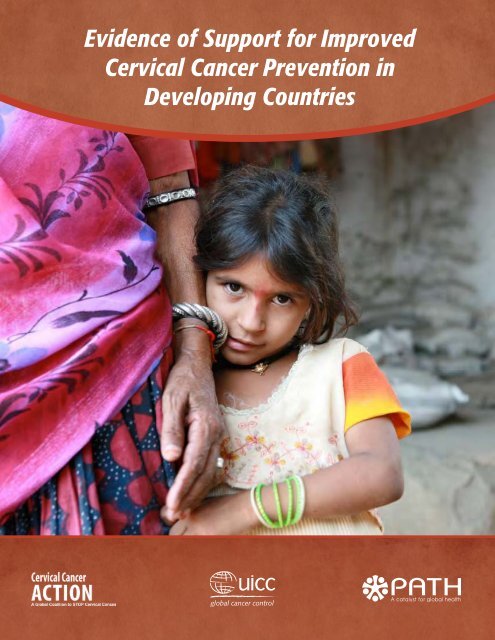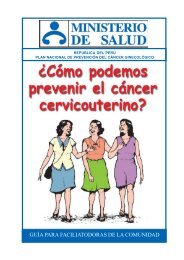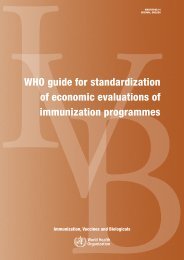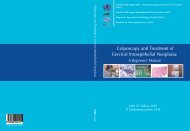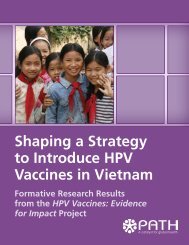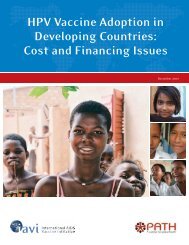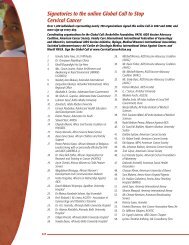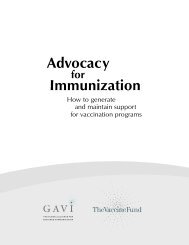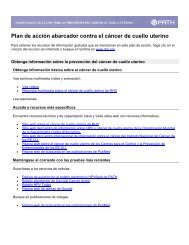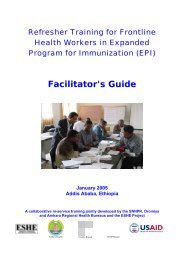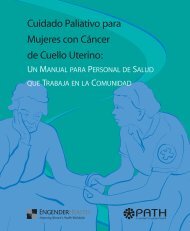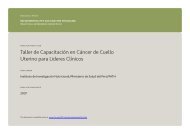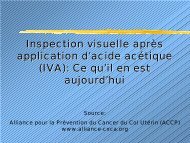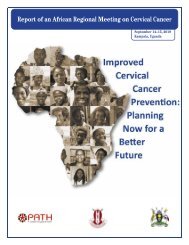Evidence of Support for Improved Cervical Cancer Prevention ... - RHO
Evidence of Support for Improved Cervical Cancer Prevention ... - RHO
Evidence of Support for Improved Cervical Cancer Prevention ... - RHO
Create successful ePaper yourself
Turn your PDF publications into a flip-book with our unique Google optimized e-Paper software.
<strong>Evidence</strong> <strong>of</strong> <strong>Support</strong> <strong>for</strong> <strong>Improved</strong><br />
<strong>Cervical</strong> <strong>Cancer</strong> <strong>Prevention</strong> in<br />
Developing Countries
Over 360 letters and articles <strong>of</strong> support <strong>for</strong> cervical cancer prevention<br />
Europe, United States, and other countries<br />
64<br />
Latin America<br />
22<br />
Africa<br />
250<br />
29<br />
Asia<br />
About the dossier<br />
+1,200 Signatories to the Global Call to Stop <strong>Cervical</strong> <strong>Cancer</strong><br />
This dossier compiles messages from leaders in the countries most affected by cervical cancer.<br />
<strong>Cervical</strong> cancer is a huge problem worldwide, with about 270,000 deaths every year. Most <strong>of</strong> those deaths occur in Africa, Asia, and Latin America. The<br />
letters, video messages, editorials, and declarations in this dossier express support <strong>for</strong> improved cervical cancer prevention—screening and vaccination—<strong>for</strong><br />
women throughout the developing world.<br />
In addition to the documents, the dossier includes the names <strong>of</strong> over 1,200 individuals, representing nearly 700 organizations, who signed an online<br />
“Global Call to Stop <strong>Cervical</strong> <strong>Cancer</strong>” in 2007 and 2008.<br />
This evidence was compiled by <strong>Cervical</strong> <strong>Cancer</strong> Action, PATH and UICC. It may be freely shared <strong>for</strong> educational and noncommercial purposes.<br />
<strong>Cervical</strong> <strong>Cancer</strong> Action is an advocacy coalition with the goal <strong>of</strong> expediting global availability, af<strong>for</strong>dability and accessibility <strong>of</strong> new cervical cancer<br />
prevention tools; strategic advocacy <strong>for</strong> expanded political will and financial commitment and civil society mobilization and support. Sign the Global Call<br />
to Stop <strong>Cervical</strong> <strong>Cancer</strong> at www.<strong>Cervical</strong><strong>Cancer</strong>Action.org.<br />
PATH, a founding member <strong>of</strong> <strong>Cervical</strong> <strong>Cancer</strong> Action, is an international nonpr<strong>of</strong>it organization that creates sustainable, culturally relevant solutions,<br />
enabling communities worldwide to break longstanding cycles <strong>of</strong> poor health. For more in<strong>for</strong>mation, please visit www.path.org.<br />
The International Union Against <strong>Cancer</strong>, or UICC, also is a founding member <strong>of</strong> <strong>Cervical</strong> <strong>Cancer</strong> Action and is the leading international nongovernmental<br />
organization dedicated exclusively to the global control <strong>of</strong> cancer. Its vision is <strong>of</strong> a world where cancer is eliminated as a major lifethreatening<br />
disease <strong>for</strong> future generations. For further in<strong>for</strong>mation, please visit www.uicc.org.<br />
Special thanks to Princess Nikky Onyeri <strong>for</strong> help gathering letters from leaders in Africa.<br />
For more in<strong>for</strong>mation about cervical cancer, visit <strong>RHO</strong> <strong>Cervical</strong> <strong>Cancer</strong> at www.rho.org.
PORTAL / SALA DE PRENSA VIRTUAL AÑO DE LAS CUMBRES MUNDIALES EN EL PERÚ Viernes, 06 de junio de 2008<br />
Lima, 09 de Mayo del 2008<br />
Ministro de Salud encabezó lanzamiento de campaña en Piura<br />
Garrido Lecca planteó compra conjunta de vacuna entre países<br />
Piura.- Un total de 9 mil 463 niñas de Piura, Ucayali y Ayacucho serán vacunadas sin<br />
costo alguno contra el papiloma virus con el fin de prevenir el cáncer de cuello uterino,<br />
enfermedad considerada como la primera causa de muerte por cáncer en mujeres en<br />
Perú, así lo sostuvo el ministro de Salud, Hernán Garrido-Lecca, quien hoy lanzó la<br />
Campaña de Vacunación contra el Papiloma Virus.<br />
En el frontis de la Municipalidad de Piura, Garrido-Lecca, dijo que en estas regiones se vacunará a niñas del 5to<br />
grado de primaria a partir de los 9 años, con tres dosis de la vacuna contra el Virus del Papiloma Humano (VPH).<br />
Así en Piura se inmunizará a 7100 niñas, en Ucayali 1215 y en Ayacucho 1148, todas pertenecientes a 580<br />
instituciones educativas.<br />
Asimismo, señaló que en la pasada Reunión de Ministros de Salud del Área Andina planteó a sus pares la compra<br />
conjunta de la vacuna contra el papiloma virus. “Si juntamos esfuerzos entre los países y hacemos una compra<br />
conjunta apodemos abaratar el costo de esta vacuna que bordea los 300 dólares”, sostuvo.<br />
Por su parte, la <strong>of</strong>icial de Programas del PATH, Jennifer Winkler, señaló que dicha estrategia de prevención se logra<br />
gracias a que en 2007, se suscribió el Memorando de Entendimiento entre el MINSA y el PATH para realizar el<br />
“Estudio de Estrategias para Vacunar contra Cáncer de Cuello Uterino en Perú” en zonas rurales y urbanas de<br />
pobreza.<br />
Comentó que su institución da este apoyo debido a que esta enfermedad es un problema grave que mata a 270<br />
mil mujeres a nivel mundial y en el Perú a más de 2600 cada año.<br />
En tanto, el director Regional de Salud de Piura, Dr. Walter Vegas, sostuvo que la región le ha dado énfasis a este<br />
tema por lo tiene programado vacunar a 7 mil 100 niñas este año. Asimismo agradeció la participación activa del<br />
sector Educación, ya que a través de sus maestros se está difundiendo el conocimiento de este tema en padres de<br />
familia y estudiantes.<br />
Añadió que para la vacunación, la Región de Salud movilizará al personal de 122 establecimientos de salud que<br />
vacunarán en 527 instituciones educativas de Piura. La primera dosis será aplicada en mayo, la segunda en julio y<br />
la última en noviembre.<br />
Culminada la ceremonia se premió a tres instituciones educativas que participaron del concurso de historietas<br />
sobre el papiloma virus.<br />
Supervisión a hospitales<br />
Garrido-Lecca arribó en la víspera a Piura, iniciando de inmediato la supervisión de la atención en el servicio de<br />
emergencia del Hospital Santa Rosa, en tanto a primeras horas de hoy viernes visitó los establecimientos de salud<br />
de Morropón y Chulucanas donde supervisó la construcción de la tercera etapa del CLAS Chulucanas.<br />
Luego se dirigió al puesto de salud Laynas donde, a pesar de ser las 8:30 a.m. no existía personal y no se atendía<br />
al público, por lo que ordenó iniciar las acciones administrativas a los trabajadores que resulten responsables.<br />
En horas de la tarde tiene previsto acudir a Paita donde analizará temas de contaminación.<br />
Opciones<br />
Imprimir noticia<br />
EFEMÉRIDES<br />
SÍNTESIS INFORMATIVA<br />
ACTIVIDADES OFICIALES / AGENDA<br />
COMUNICADOS<br />
FOTOTECA<br />
MINSA REGIONES<br />
BIBLIOTECA VIRTUAL EN SALUD<br />
MEDIOS DE COMUNICACIÓN DEL<br />
ESTADO<br />
DIRECTORIO DE ENLACES<br />
OTRAS NOTICIAS<br />
MINISTRO RINDIÓ<br />
HOMENAJE AL AGENTE<br />
COMUNITARIO DE SALUD<br />
GOBIERNO REGIONAL DE<br />
AREQUIPA LEVANTA<br />
SUSPENSIÓN DE CAMPAÑA<br />
DE VACUNACIÓN CONTRA<br />
HEPATITIS B<br />
Comisión del MINSA aclaró tema<br />
del Timerosal en las vacunas<br />
MINSA FIRMA CONVENIO<br />
CON FUNDACION SUIZA PARA<br />
EL MONITOREO DE LA<br />
CALIDAD DEL AIRE<br />
A fin de prevenir riesgos en la<br />
Salud de la Población Peruana<br />
MINISTRO JURAMENTÓ A<br />
CUATRO DE CINCO NUEVOS<br />
DIRECTORES DE HOSPITALES<br />
E INSTITUTOS DE SALUD<br />
Se continuará con nombramientos<br />
en hospitales y jefaturas de servicio<br />
DEPORTISTAS QUE<br />
PARTICIPARÁN EN JUEGOS<br />
OLÍMPICOS DE BEIJING SON<br />
VACUNADOS CONTRA LA<br />
HEPATITIS B<br />
Bajo el lema “Que nadie detenga tú<br />
futuro menos tú”<br />
MAS NOTICIAS<br />
Samples from the dossier<br />
Dear Colleagues,<br />
The burden <strong>of</strong> cervical cancer is high in our country – cancer wards are full, yet we know<br />
that many women still suffer alone, far from any help our health system can <strong>of</strong>fer. When<br />
these women pass away, the loss is community – wide. Although our country has been<br />
committed to end this disease <strong>for</strong> some time, we have not had the appropriate tools, until<br />
now.<br />
Today, vaccines <strong>for</strong> girls, and new and improved screening and treatment <strong>for</strong> all women,<br />
provide the opportunity to realize our commitment. News stories about the new vaccines<br />
have spurred widespread interest in cervical cancer in our country – health providers, the<br />
media, NGOs and others are all talking about it. We see potential <strong>for</strong> new partnerships<br />
between sectors (health and education) and NGOs (women health, cancer, youth, HIV)<br />
focusing on this issue.<br />
We are not naïve about the challenges <strong>of</strong> improving vaccination and screening in our<br />
country, but we share your commitment to find new ways to make this vaccine work <strong>for</strong><br />
the girls and women <strong>of</strong> our country. We extend our hope that the WHO, the GAVI<br />
Alliance, and others also will do their part so that these vaccines and screening<br />
technologies can become accessible in our country as quickly as possible.<br />
We hope to share with you in matching the opportunity <strong>of</strong> technology with our collective<br />
vision and leadership.<br />
Best regards,<br />
MINSA INICIA VACUNACIÓN GRATUITA CONTRA PAPILOMA VIRUS A MÁS DE 9<br />
MIL NIÑAS DE PIURA, UCAYALI Y AYACUCHO<br />
Shabana Azmi<br />
Uganda: Op-ed by Parliamentarian<br />
Sarah Nyombi<br />
India: Letter from Parliamentarian<br />
Shabana Azmi<br />
Peru: Statement by Minister <strong>of</strong> Health<br />
Hernán Garrido-Lecca<br />
In case <strong>of</strong> reply the number<br />
And the date <strong>of</strong> this letter<br />
should be quoted<br />
MINISTRY OF HEALTH<br />
P O BOX M-44<br />
ACCRA<br />
February 27, 2008<br />
To <strong>Cervical</strong> <strong>Cancer</strong> Action:<br />
We understand that <strong>Cervical</strong> <strong>Cancer</strong> Action is gathering evidence <strong>of</strong><br />
global and country-level support <strong>for</strong> improved cervical cancer<br />
prevention. This letter indicates our strong support <strong>for</strong> comprehensive<br />
programs to protect girls and older women from this terrible disease. In<br />
our opinion, cervical cancer is something we can and should do<br />
something about.<br />
The pain and suffering caused by cervical cancer are a major affliction<br />
<strong>for</strong> women <strong>of</strong> all ages in the developing world, particularly in countries<br />
<strong>of</strong> Africa and South Asia. As you may know, 85 percent <strong>of</strong> cervical<br />
cancer deaths occur in the developing world, in large part because<br />
screening programs do not reach many women in time. <strong>Improved</strong><br />
screening and treatment, along with future vaccination, will be important<br />
elements <strong>of</strong> programs to reduce cervical cancer mortality.<br />
We share your commitment that access to new technologies should<br />
follow disease, not wealth. It is crucial that the costs <strong>of</strong> HPV vaccine and<br />
new screening technologies be reduced, and that access be increased as<br />
quickly as possible. We stand ready to work in partnership with the<br />
global community to make these new tools available appropriately and<br />
effectively to the girls and women who need them most.<br />
Sincerely,<br />
Jane Schaller MD<br />
Executive Director<br />
International Pediatric Association<br />
12 th March, 2007<br />
My Ref No. MOH/GAD/CervCa/002<br />
Your Ref No. ...................<br />
TEL. No:233-21-684247/665323/660301/679487<br />
REPUBLIC OF GHANA<br />
FAX No:233-21-670076/663810/660176<br />
To whom it may concern:<br />
Ghana will like to add its voice to the growing chorus <strong>of</strong> organizations intent on<br />
mobilizing significant action against cervical cancer. For that reason, we have shared this<br />
communication with <strong>Cervical</strong> <strong>Cancer</strong> Action <strong>for</strong> inclusion in a global dossier<br />
documenting international interest in the issue.<br />
In Ghana, cervical cancer is one <strong>of</strong> the most common female cancers and many <strong>of</strong> our<br />
women suffer terribly from this disease. When mothers, aunties, or grandmothers die<br />
from cervical cancer, it can tear the fabric <strong>of</strong> the family and put additional pressure on<br />
scarce, local resources. In some places it is common <strong>for</strong> these women to be caretakers <strong>of</strong><br />
children left orphaned by HIV and other diseases.<br />
Now we have an unprecedented opportunity to make a difference. New evidence suggests<br />
that simple visual inspection methods and new HPV DNA tests could make pre-cancer<br />
screening a reality even in the most remote settings. Better screening will result in lives<br />
saved in the next few years.<br />
Furthermore, HPV vaccines given to young girls now will prevent future infections and<br />
save lives <strong>for</strong> decades to come. Programs designed to protect adolescent girls through<br />
vaccination have the potential also to <strong>of</strong>fer other needed health interventions to that<br />
underserved population.<br />
Our country is ready to work in partnership with the global community to make these<br />
new tools available appropriately and effectively to the girls and women who need them<br />
most.<br />
Sincerely,<br />
Global: Letter from Dr. Jane Schaller<br />
International Pediatric Association<br />
Global: Letter from Mary Robinson,<br />
Realizing Rights: the Ethical<br />
Globalization Initiative<br />
Ghana: Letter from Minister <strong>of</strong> Health<br />
Major Courage E.K. Quashigah<br />
Video statement by Ellen Johnson Sirleaf<br />
President <strong>of</strong> Liberia<br />
This video statement was sent to participants in the<br />
UNIFEM-EC conference Fight against cervical cancer: challenges<br />
and opportunities <strong>for</strong> women's health, held<br />
27-28 September, 2007 at the Palais d'Egmont in Brussels.<br />
Following are excerpts from President Johnson Sirleaf’s statement.<br />
The full statement will be available <strong>for</strong> viewing online soon.<br />
“<strong>Cervical</strong> cancer is an insidious disease that effects women in the prime <strong>of</strong> their lives. It is the leading<br />
cause <strong>of</strong> cancer death among women in developing countries…And yet, with good screening and follow<br />
up treatment, the disease is totally preventable…There also are two new vaccines.<br />
My message to you today is to be visionary. Let us not get bogged down in bureaucracy and bottlenecks<br />
at this stage…We should use this process to improve women’s health and to involve all key actors…I<br />
would like to see healthy and educated women, at all levels <strong>of</strong> society, making decisions about their<br />
lives and the health <strong>of</strong> our country.<br />
In Liberia, we now have a strong immunization program <strong>for</strong> children under five…we also vaccinate in<br />
schools, providing the plat<strong>for</strong>m <strong>for</strong> a pre-teen health package…If we think big, opportunities abound and<br />
creativity is enhanced.<br />
The international community has already shown its commitment to health <strong>for</strong> all by creating various<br />
mechanisms to ensure that new health technologies reach those who need them, not only those who can<br />
af<strong>for</strong>d them…I know that you share my vision that in the near future women around the world will not<br />
need to worry about themselves or their daughters who are vulnerable to this disease.<br />
Today I would like to add my voice to those demanding that cervical cancer prevention gets the<br />
international political recognition it deserves. I feel that we are at the threshold <strong>of</strong> a new era <strong>of</strong> cervical<br />
cancer prevention. Let us now make this rhetoric into reality.”<br />
President Ellen Johnson Sirleaf<br />
September 2007<br />
DECLARATION <strong>of</strong> the MEETING<br />
TOWARDS COMPREHENSIVE CERVICAL CANCER PREVENTION AND CONTROL<br />
Mexico City 12-13 May, 2008<br />
Recognizing that cervical cancer is one <strong>of</strong> the most common causes <strong>of</strong> death among women in Latin America and<br />
the Caribbean (LAC);<br />
That 33,000 women die each year <strong>of</strong> cervical cancer in Latin America and the Caribbean.<br />
That it is estimated that, if this trend continues, the number <strong>of</strong> deaths from cervical cancer will double by 2030.<br />
That it primarily affects vulnerable populations such as poor women and indigenous populations.<br />
Expressing concern <strong>for</strong> the high burden <strong>of</strong> this disease, with the highest mortality rates in the world and its<br />
economic impact in Latin America and Caribbean.<br />
That now we know HPV causes virtually 100% <strong>of</strong> cervical cancers.<br />
That today there are vaccines against HPV, which <strong>of</strong>fer great hope towards the prevention <strong>of</strong> 70% <strong>of</strong> the<br />
infections by this virus.<br />
That the primary limitation <strong>for</strong> its use is the high cost.<br />
That vaccines against HPV do not replace screening programs, diagnostics and treatment.<br />
That with the introduction <strong>of</strong> this vaccine we have an opportunity to strengthen prevention and comprehensive<br />
control through improving coverage and quality <strong>of</strong> screening, diagnostics, and treatment services.<br />
The participants resolve to:<br />
Promote the integration among programs responsible <strong>for</strong> immunization, cancer prevention and control, and<br />
adolescent and reproductive health with the goal <strong>of</strong> strengthening ef<strong>for</strong>ts toward the prevention and control <strong>of</strong><br />
cervical cancer.<br />
Take the opportunity with the introduction <strong>of</strong> the vaccine against HPV to strengthen sexual and reproductive<br />
education, training <strong>of</strong> personnel, as well as cancer screening services, diagnostics and treatment.<br />
Continue considering immunization programs as a regional public good with high political priority.<br />
Consider the introduction <strong>of</strong> a vaccine against HPV based on technical, programmatic and operational criteria <strong>of</strong><br />
individual countries, taking into consideration the need to strengthen the cold chain, epidemiological surveillance<br />
systems, and the laboratory network in countries.<br />
Work together and with PAHO's Revolving Fund to obtain af<strong>for</strong>dable prices <strong>for</strong> HPV vaccines so that all the<br />
countries in the region can introduce the vaccine in their national immunization programs as soon as possible.<br />
Generate mechanisms and negotiating processes with high-level financing stakeholders at the national level,<br />
which will ensure the sustainability <strong>of</strong> vaccination programs, prevention and control <strong>of</strong> cervical cancer.<br />
Country Participants<br />
Argentina<br />
Cuba<br />
México<br />
Barbados<br />
Dominican Republic<br />
Nicaragua<br />
Brazil<br />
Ecuador<br />
Panamá<br />
Canada<br />
El Salvador<br />
Paraguay<br />
Chile<br />
Guatemala<br />
Peru<br />
Colombia<br />
Honduras<br />
United States<br />
Costa Rica<br />
Jamaica<br />
Venezuela<br />
Tanzania: Letter from the Association<br />
<strong>of</strong> Gynaecologists and Obstetricians<br />
Liberia: Video message from<br />
President Ellen Johnson Sirleaf<br />
Americas: Declaration signed<br />
by 21 countries
FIGO is incorporated under the Swiss Civil Code and established at 42 rue du 31 Decembre, Geneva, Switzerland<br />
President:: Pr<strong>of</strong>essor D Shaw (Canada), Vice-President:: Dr S Zaidi (Pakistan), President-Elect:: Pr<strong>of</strong>essor G Serour (Egypt), Past-President: Pr<strong>of</strong>essor A Acosta<br />
(Paraguay), Honorary Treasurer: Associate Pr<strong>of</strong>essor J Liljestrand (Sweden), Honorary Secretary: Pr<strong>of</strong>essor I Fraser (Australia)<br />
Fédération Internationale de<br />
Gynécologie et d’Obstétrique<br />
International Federation <strong>of</strong><br />
Gynecology and Obstetrics<br />
Secretariat: FIGO House<br />
Suite 3, Waterloo Court,<br />
10 Theed St, London SE1 8ST<br />
United Kingdom<br />
Telephone: +44 20 7928 1166<br />
Fax: +44 20 7928 7099<br />
Email: figo@figo.org<br />
Website: http://www.figo.org<br />
SOCIALIST REPUBLIC OF VIETNAM<br />
Ministry <strong>of</strong> Health<br />
Maternal and Child Health Department<br />
138 A Giang Vo Str.<br />
Ha Noi, Viet Nam<br />
Phone: (84-4)8.464.060<br />
Fax: (84-4)8.464.060<br />
LETTER OF SUPPORT TO IMPROVE CERVICAL CANCER PREVENTION WORLDWIDE<br />
To <strong>Cervical</strong> <strong>Cancer</strong> Action:<br />
The International Federation <strong>of</strong> Gynecology and Obstetrics (FIGO) is submitting this letter to<br />
express our Federation’s strong support <strong>for</strong> rapid global access to comprehensive programmes<br />
to protect girls and women from cervical cancer.<br />
This terrible disease which causes so much pain and suffering hits the low resource countries<br />
particularly hard. Approximately 85 % <strong>of</strong> cervical cancer deaths occur in low resource<br />
countries and these deaths can tear the fabric <strong>of</strong> the family and put additional pressure on<br />
scarce, local resources. In some places it is common <strong>for</strong> these women to be caretakers <strong>of</strong><br />
children left orphaned by HIV and other diseases. Many deaths resulting from cervical cancer<br />
could be avoided if all girls and women were given timely access to improved screening and<br />
treatment, along with the possibility <strong>of</strong> future vaccination.<br />
We share your commitment that access to new technologies should follow disease not wealth.<br />
It is crucial that the costs <strong>of</strong> HPV vaccine and new screening technologies be reduced and<br />
access increased as quickly as possible. We stand ready to work in partnership with the global<br />
community to make these tools available appropriately and effectively to the girls and women<br />
who need them most.<br />
Dorothy Shaw<br />
President<br />
Ha Noi March 27, 2008<br />
To <strong>Cervical</strong> <strong>Cancer</strong> Action<br />
c/o American <strong>Cancer</strong> Society<br />
588 Broadway, Suite 504<br />
New York, NY 10012<br />
Dear Sir/Madam,<br />
We understand that <strong>Cervical</strong> <strong>Cancer</strong> Action is gathering evidence <strong>of</strong> global and countrylevel<br />
support <strong>for</strong> improved cervical cancer prevention. By this letter we would like to<br />
express our strong support <strong>for</strong> comprehensive programs to protect girls and older women<br />
from this dangerous but preventive disease.<br />
We know that about 85 percent <strong>of</strong> cervical cancer deaths occur in the developing world<br />
including Vietnam, in large part because screening programs do not reach many women<br />
in time. <strong>Improved</strong> screening and treatment, along with future vaccination, will be<br />
important elements <strong>of</strong> programs to reduce mortality.<br />
We fully agree with you that access to new technologies should follow disease not<br />
wealth. It is crucial that the costs <strong>of</strong> HPV vaccine and new screening technologies be<br />
reduced, and access increased, as quickly as possible. We are ready to work with the<br />
global community to make these new tools available appropriately and effectively to the<br />
girls and women who need them most.<br />
My best wishes <strong>for</strong> our future cooperation. Thank you <strong>for</strong> your cooperation and support<br />
Yours sincerely,<br />
We understand that <strong>Cervical</strong> <strong>Cancer</strong> Action is gathering evidence <strong>of</strong><br />
global and country-level support <strong>for</strong> improved cervical cancer<br />
prevention. This letter indicates our strong support <strong>for</strong> comprehensive<br />
programs to protect girls and older women from this terrible disease.<br />
In our opinion, cervical cancer is something we can and should do<br />
something about.<br />
The pain and suffering caused by cervical cancer hits the developing<br />
world particularly hard. As you may know, 85 percent <strong>of</strong> cervical cancer deaths occur in the<br />
developing world, in large part because screening programs do not reach many women in time.<br />
<strong>Improved</strong> screening and treatment, along with future vaccination, will be important elements <strong>of</strong><br />
programs to reduce cervical cancer mortality.<br />
As a participant in the 2 nd Stop <strong>Cervical</strong> <strong>Cancer</strong> Conference in Africa: Accelerating Access to<br />
HPV Vaccines Conference, Kampala – Uganda, (July 21 st – 2 nd , 2008), having listened and<br />
contributed to various discussions, I now realize the urgency <strong>of</strong> focusing attention on <strong>Cervical</strong><br />
<strong>Cancer</strong> prevention with particular emphasis on increasing access to screening services and<br />
making the HPV vaccine af<strong>for</strong>dable <strong>for</strong> the women <strong>of</strong> Africa.<br />
Signed<br />
Nguyen Duy Khe, MD, PhD.<br />
Director<br />
Department <strong>of</strong> Maternal and Child Health.<br />
Cc: International Cooperation Department<br />
Hon. Mrs. Janet K Museveni<br />
The First Lady's Office<br />
State House Entebbe<br />
Global: Letter from Dorothy Shaw<br />
International Federation<br />
<strong>of</strong> Gynecology and Obstetrics<br />
Vietnam: Letter from MCH Director<br />
Dr. Nguyen Duy Khe<br />
Uganda: Letter from First Lady<br />
Hon. Mrs. Janet K. Museveni<br />
<br />
The Obstetrical & Gynaecological<br />
<br />
Society <strong>of</strong> the Sudan<br />
<br />
Fax: 782786<br />
782786 :<br />
P. O Box: 2553<br />
2553 . .<br />
Khartoum - Sudan<br />
/ <br />
To: <strong>Cervical</strong> <strong>Cancer</strong> Action<br />
To whom it may concern:<br />
I am Sabikat Kassim-Momodu commissioner <strong>for</strong> Women Affairs and Social Development Edo State ,<br />
part <strong>of</strong> the mandate <strong>of</strong> my ministry is to <strong>for</strong>mulate policies and program geared towards improving<br />
the life <strong>of</strong> women, children, disabled and the less privilege.<br />
One <strong>of</strong> the programs we are promoting in my State is screening <strong>for</strong> cancer <strong>of</strong> the cervix with acetic<br />
acid and subsequent treatment with cryogun.<br />
We would there<strong>for</strong>e like to add our voices to the growing chorus <strong>of</strong> organizations intent on<br />
mobilizing significant action against cervical cancer. For that reason, we have shared this<br />
communication with <strong>Cervical</strong> <strong>Cancer</strong> Action <strong>for</strong> inclusion in a global dossier documenting<br />
international interest in the issue.<br />
In Nigeria, cervical cancer is one <strong>of</strong> the most common female cancers and many <strong>of</strong> our women<br />
suffer terribly from this disease. Their death can tear the fabric <strong>of</strong> the family and put additional<br />
pressure on scarce, local resources. In some places it is common <strong>for</strong> these women to be caretakers<br />
<strong>of</strong> children left orphaned by HIV and other diseases.<br />
Now we have an unprecedented opportunity to make a difference. New evidence suggests that<br />
simple visual inspection methods and new HPV DNA tests could make pre-cancer screening a<br />
reality even in the most remote settings. Better screening will result in lives saved in the next few<br />
years. We have been able to train some health attendants in the rural areas on how to screen <strong>for</strong><br />
cancer <strong>of</strong> the cervix and the treatment there after with cryogun. We are yet to procure this<br />
equipment <strong>for</strong> all the local government areas.<br />
Furthermore, we are in<strong>for</strong>med that HPV vaccines given to young girls now will prevent future<br />
infections and save lives <strong>for</strong> decades to come. Programs designed to protect adolescent girls<br />
through vaccination have the potential also to <strong>of</strong>fer other needed health interventions to that<br />
underserved population.<br />
Our country is ready to work in partnership with the global community to make these new tools<br />
available appropriately and effectively to the girls and women who need them most. Please<br />
contact us <strong>for</strong> any further in<strong>for</strong>mation.<br />
Sincerely,<br />
Sabikat Kassim-Momodu<br />
Honourable Commissioner<br />
We would like join with women groups, social leaders, policy makers, and<br />
international organization in their support to cervical cancer action in its global call<br />
to stop cervical cancer. <strong>Cancer</strong> <strong>of</strong> the cervix is an important cause <strong>of</strong> morbidity and<br />
mortality especially in developing countries. We are concerned that, by the year<br />
2020, 95% <strong>of</strong> cases are expected to occur in this part <strong>of</strong> the world, where more than<br />
quarter <strong>of</strong> a million will die from cervical cancer every year.<br />
Condition in Sudan does not differ from other developing countries. Despite the<br />
increased prevalence <strong>of</strong> the disease, few effective programs are available. Most<br />
patients still present at an advanced state <strong>of</strong> disease. The only available treatment is<br />
surgery or radiotherapy which is expensive and not accessible to most affected<br />
women. The primary approach to the control <strong>of</strong> the disease is there<strong>for</strong>e through<br />
prevention. Organized cytology screening programs are not feasible in many<br />
resource-poor setting, due to lack <strong>of</strong> infrastructure and demands <strong>of</strong> other competing<br />
heath needs.<br />
Considerable attention is now being given to the development <strong>of</strong> alternative and<br />
easy af<strong>for</strong>dable methods. New evidence showed that visual inspection methods and<br />
new HPV DNA tests can play an important role in the prevention and control <strong>of</strong><br />
cervical cancer. Further more, HPV vaccine though appear remote from being used<br />
in the developing world due to cost and other social factors, but in reality it’s the<br />
only effective modality to protect our adolescent girls from this dreadful disease.<br />
The obstetrical and gynecological society <strong>of</strong> Sudan (OGSSD) is committed to work<br />
in partnership with the international community in its ef<strong>for</strong>t to combat cervical<br />
cancer. We recognize that only a comprehensive prevention strategy that pairs<br />
cervical cancer vaccination with screening and treatment programs will reverse the<br />
threat <strong>of</strong> cervical cancer.<br />
We believe and share the vision that access to improve screening programs and<br />
treatment, along with future vaccination are important women rights. We there<strong>for</strong>e<br />
share with other committed organization their support and endorsement to cervical<br />
cancer action in its great ef<strong>for</strong>ts to demonstrate broad-based global support to protect<br />
women from cervical cancer worldwide<br />
Pr<strong>of</strong>. Abdel Latif Ashmaig<br />
President<br />
The obstetrical and gynecological society <strong>of</strong> Sudan<br />
Nigeria: Letter from Comm.<br />
S. Kassim-Momodu Ministry <strong>of</strong><br />
Women’s Affairs<br />
Sudan: Letter from Pr<strong>of</strong>. A.L.<br />
Ashmaig, Obstetrical and<br />
Gynecological Society<br />
Global: Letter from Catherine<br />
Hankins, UNAIDS
Contents<br />
Africa<br />
Letters<br />
• 219 signed letters from the 2nd Stop <strong>Cervical</strong> <strong>Cancer</strong> conference in Africa<br />
• Burundi: Alliance Burundaise contre le cancer<br />
• Cameroon: Society <strong>of</strong> GYN-OB <strong>of</strong> Cameroon<br />
• Egypt: Egyptian Society <strong>of</strong> GYN-OB<br />
• Ethiopia: Mathiwos Wondu YeEthiopia <strong>Cancer</strong> Society<br />
• Ghana: Republic <strong>of</strong> Ghana Ministry <strong>of</strong> Health<br />
• Liberia: Video message from Pres. Ellen Johnson Sirleaf<br />
• Malawi: Christian Health Association <strong>of</strong> Malawi<br />
• Morocco: Ministry <strong>of</strong> Health<br />
• Niger: Tous unis contre le cancer<br />
• Nigeria: Ministry <strong>of</strong> Women’s Affairs<br />
• Nigeria: Princess Nikky Breast <strong>Cancer</strong> Foundation<br />
• Nigeria: Lagos State Government Ministry <strong>of</strong> Health / Care Organisation Public Enlightenment<br />
• Nigeria: Society <strong>of</strong> Oncology and <strong>Cancer</strong> Research <strong>of</strong> Nigeria<br />
• South Africa: AORTIC<br />
• South Africa: South African Society <strong>of</strong> OB-GYN<br />
• Sudan: OB-GYN Society <strong>of</strong> the Sudan<br />
• Tanzania: The Association <strong>of</strong> Gynaecologists and Obstetricians <strong>of</strong> Tanzania<br />
• Tunisia: Association Tunisienne de lutte contre le cancer<br />
• Uganda: First Lady Hon. Mrs. Janet K. Museveni<br />
• Uganda: Parliamentarian Hon. Sarah Nyombi Nansubuga<br />
• Uganda: Minister <strong>of</strong> Health, Hon. Richard Nduhuura<br />
• Uganda: Ministry <strong>of</strong> Health, Dr. Steven Malinga<br />
• Zimbabwe: World Health Organization AFRO region<br />
Articles<br />
• Kenya: Africa Science News Service<br />
• Kenya: Business Daily<br />
• Kenya: AllAfrica.com<br />
• Kenya: Horn <strong>of</strong> Africa News<br />
• Kenya: Kenya Times<br />
• Liberia: Mail & Guardian<br />
• Nigeria: AORTIC newsletter<br />
• Nigeria: The Guardian<br />
• Nigeria: Stop <strong>Cervical</strong> <strong>Cancer</strong> in Africa meeting report<br />
• Uganda: <strong>Cervical</strong> <strong>Cancer</strong> Partnership Workshop<br />
• Uganda: Daily Monitor<br />
• Uganda: The Monitor, S. Nyombi<br />
• Uganda: The Monitor, R. Kabejja<br />
• Uganda: The New Vision Discussion Board<br />
• Uganda: Parliamentary cervical cancer briefing<br />
• Uganda: Call to Action Arising from the 2nd Stop <strong>Cervical</strong> <strong>Cancer</strong> in Africa Conference<br />
• Tanzania: The Citizen<br />
• Zambia: Bulletin <strong>of</strong> the World Health Organization<br />
• Zambia: Medical News Today
Asia<br />
Letters<br />
• Bangladesh: Bangladesh <strong>Cancer</strong> Society<br />
• India: Ankur Institute <strong>of</strong> Child Health<br />
• India: <strong>Cancer</strong> Institute<br />
• India: Gujarat <strong>Cancer</strong> & Research Institute<br />
• India: Ministry <strong>of</strong> Science and Technology<br />
• India: India Medical Association, Andhra Pradesh<br />
• India: India Medical Association, Gujarat<br />
• India: Indian Academy <strong>of</strong> Pediatrics Committee On Immunization<br />
• India: Institute <strong>of</strong> Cytology and Preventive Oncology<br />
• India: Parliamentarian Shabana Azmi<br />
• India: TATA Memorial Centre<br />
• India: Dr. Pankaj D. Desai<br />
• Indonesia: Indonesian <strong>Cancer</strong> Foundation<br />
• Korea: Korean Society <strong>of</strong> OB-GYN<br />
• Malaysia: Breast <strong>Cancer</strong> Welfare Association<br />
• Malaysia: Breast <strong>Cancer</strong> Welfare Association<br />
• Pakistan: Shaukat Khanum Memorial <strong>Cancer</strong> Hospital & Research Centre<br />
• Taiwan: Hope Society <strong>for</strong> <strong>Cancer</strong> Care<br />
• Thailand: The Royal Thai College <strong>of</strong> OB-GYN<br />
• Thailand: Thai Gynecologic <strong>Cancer</strong> Society<br />
• Vietnam: Ho Chi Mihn Oncology Hospital<br />
• Vietnam: Ministry <strong>of</strong> Health, Maternal and Child Health<br />
• Vietnam: National <strong>Cancer</strong> Hospital<br />
Articles<br />
• India: The Hindu<br />
• Malaysia: The Star<br />
• Malaysia: The Star<br />
• Nepal: The Rising Nepal<br />
• Vietnam: Viet Nam News<br />
• Vietnam: Viet Nam News<br />
Latin America<br />
Letters<br />
• Argentina: Instituto Henry Moore<br />
• Argentina: Latin American and Caribbean Society <strong>of</strong> Medical Oncology<br />
• Argentina: Liga Argentina de Lucha Contra el Cáncer<br />
• Argentina: Sociedad Latinoamericana y del Caribe de Oncología Médica<br />
• Bolivia: Fundación Boliviana Contra el Cáncer<br />
• Dominican Republic: Insituto Oncologoco regional del Cibao<br />
• Guatemala: Liga Nacional Contra el Cáncer<br />
• Honduras: Asociación Hondureña de lucha contra el cáncer<br />
• Mexico: Asociación Mexicana de Lucha contra el Cáncer<br />
• Mexico: Instituto Nacional de <strong>Cancer</strong>ología<br />
• Peru: Inppares<br />
• Peru: Minister <strong>of</strong> Health, Dr. Hernán Garrido-Lecca<br />
• Peru: Ministry <strong>of</strong> Health, Dr. Fresia Cardenas Garcia<br />
• Peru: Ministry <strong>of</strong> Health, Dr. Luis Miguel Leon, National Director <strong>of</strong> Integral Health, MINSA<br />
• Peru: National Immunization Strategy, María Ana Mendoza<br />
• Uruguay: Comisión Honoraria de Lucha Contra el Cáncer
Contents continued<br />
Articles<br />
• Brazil: Declaration from the Second International <strong>Cancer</strong> Control Congress<br />
• May 2008 declaration by 21 countries <strong>of</strong> the Americas<br />
• Mexico: World Markets Research Centre<br />
• Peru: Ministry <strong>of</strong> Health website HPV vaccine launch<br />
• Peru: Documental Piura<br />
• Pan American Health Organization 47th Directing Council resolution<br />
Europe, US, and other countries<br />
Letters<br />
• USA: AIDS Vaccine Advocacy Coalition<br />
• USA: American <strong>Cancer</strong> Society International, Johanna Ralston<br />
• USA: American <strong>Cancer</strong> Society International, Dr. John Seffrin<br />
• USA: American Society <strong>of</strong> Clinical Oncology<br />
• USA: Association <strong>of</strong> Reproductive Health Pr<strong>of</strong>essionals<br />
• USA: Realizing Rights: the Ethical Globalization Initiative<br />
• USA: Family Care International<br />
• USA: Global Summit <strong>of</strong> Women<br />
• USA: International AIDS Vaccine Initiative<br />
• USA: International Gynecologic <strong>Cancer</strong> Society<br />
• USA: International Psycho-Oncology Society<br />
• USA: Jhpiego, Dr. Leslie Mancuso<br />
• USA: Jhpiego, Dr. Emmanuel Otolorin<br />
• USA: Oncology Nursing Society<br />
• USA: PATH<br />
• USA: Universities Allied <strong>for</strong> Essential Medicines<br />
• Australia: The <strong>Cancer</strong> Council Queensland<br />
• Australia: The <strong>Cancer</strong> Council Australia<br />
• Australia: The <strong>Cancer</strong> Council South Australia<br />
• Australia: The <strong>Cancer</strong> Council Victoria<br />
• Belgium: Fondation Contre le <strong>Cancer</strong><br />
• Canada: British Columbia <strong>Cancer</strong> Agency<br />
• Canada: Michael G. DeGroote School <strong>of</strong> Medicine<br />
• Canada: <strong>Cervical</strong> <strong>Cancer</strong> prevention Program, <strong>Cancer</strong> Care Nova Scotia<br />
• Canada: Centre Hospitalier de l’Université de Montréal Department <strong>of</strong> Radiation Oncology Fondation<br />
Québécoise du <strong>Cancer</strong><br />
• Canada: Public Health Agency <strong>of</strong> Canada<br />
• Denmark: Danish <strong>Cancer</strong> Society<br />
• Estonia: Estonian <strong>Cancer</strong> Society<br />
• France: European Research Organisation on Genital Infection and Neoplasia<br />
• France: La Ligue<br />
• Germany: German <strong>Cancer</strong> Research Center<br />
• Italy: Associazione Italiana Malati di Cancro, parenti ed amici<br />
• Italy: Associazione Italiana di Oncologia Medica<br />
• Israel: Israel <strong>Cancer</strong> Association<br />
• Lebanon: Lebanese <strong>Cancer</strong> Society<br />
• Northern Ireland: Ulster <strong>Cancer</strong> Foundation<br />
• Norway: Norwegian <strong>Cancer</strong> Society<br />
• Norway: Norwegian Society <strong>for</strong> OB-GYN<br />
• Portugal: Liga Portuguesa Contra O Cancro<br />
• Slovakia: Liga Proti Rakovine SR<br />
• Spain: Asociación Española Contra el Cáncer
•<br />
•<br />
•<br />
•<br />
•<br />
•<br />
•<br />
•<br />
•<br />
•<br />
•<br />
•<br />
•<br />
•<br />
•<br />
Spain: Federació Catalana d’Entitats contra el Càncer<br />
Spain: Institut Català d’Oncologia<br />
Spain: Sociedad Española de Ginecologia y Obstetricia<br />
Switzerland: International Pediatric Association<br />
Switzerland: International Union Against <strong>Cancer</strong><br />
Switzerland: Dr. Bjorn Melgaard<br />
Switzerland: The Joint United Nations Programme on HIV/AIDS<br />
Switzerland: Swiss League<br />
Turkey: Turkish Association <strong>for</strong> <strong>Cancer</strong> Research and Control<br />
UK: AfrOx<br />
UK: <strong>Cancer</strong> Research UK<br />
UK: CLASP Institute <strong>for</strong> Women’s Health<br />
UK: International Federation <strong>of</strong> GYN-OB (FIGO)<br />
UK: International Planned Parenthood Foundation<br />
UK: Royal College <strong>of</strong> OB-GYN<br />
Articles<br />
• Canada: Globe & Mail<br />
• USA: Center <strong>for</strong> Global Development<br />
• USA: HPV Roundtable<br />
• USA: Medical News Today<br />
• USA: Technology, Health & Development blog<br />
• World Medical Association and the Medical Women’s International Association<br />
• Switzerland: Lancet<br />
• Switzerland: Lancet<br />
• UK: London Declaration on <strong>Cancer</strong> Control in Africa<br />
• UK: International Federation <strong>of</strong> Gynecology and Obstetrics<br />
• United Arab Emirates: Arabian Business<br />
Signatories to the online Global Call to Stop <strong>Cervical</strong> <strong>Cancer</strong><br />
Over 1,200 individuals representing nearly 700 organizations signed this online Call in 2007 and 2008, and more sign up<br />
every day. Sign the Global Call at www.<strong>Cervical</strong><strong>Cancer</strong>Action.org
Uganda
India<br />
Dear Colleagues,<br />
The burden <strong>of</strong> cervical cancer is high in our country – cancer wards are full, yet we know<br />
that many women still suffer alone, far from any help our health system can <strong>of</strong>fer. When<br />
these women pass away, the loss is community – wide. Although our country has been<br />
committed to end this disease <strong>for</strong> some time, we have not had the appropriate tools, until<br />
now.<br />
Today, vaccines <strong>for</strong> girls, and new and improved screening and treatment <strong>for</strong> all women,<br />
provide the opportunity to realize our commitment. News stories about the new vaccines<br />
have spurred widespread interest in cervical cancer in our country – health providers, the<br />
media, NGOs and others are all talking about it. We see potential <strong>for</strong> new partnerships<br />
between sectors (health and education) and NGOs (women health, cancer, youth, HIV)<br />
focusing on this issue.<br />
We are not naïve about the challenges <strong>of</strong> improving vaccination and screening in our<br />
country, but we share your commitment to find new ways to make this vaccine work <strong>for</strong><br />
the girls and women <strong>of</strong> our country. We extend our hope that the WHO, the GAVI<br />
Alliance, and others also will do their part so that these vaccines and screening<br />
technologies can become accessible in our country as quickly as possible.<br />
We hope to share with you in matching the opportunity <strong>of</strong> technology with our collective<br />
vision and leadership.<br />
Best regards,<br />
Shabana Azmi
Peru<br />
PORTAL / SALA DE PRENSA VIRTUAL AÑO DE LAS CUMBRES MUNDIALES EN EL PERÚ Viernes, 06 de junio de 2008<br />
Lima, 09 de Mayo del 2008<br />
Ministro de Salud encabezó lanzamiento de campaña en Piura<br />
MINSA INICIA VACUNACIÓN GRATUITA CONTRA PAPILOMA VIRUS A MÁS DE 9<br />
MIL NIÑAS DE PIURA, UCAYALI Y AYACUCHO<br />
Garrido Lecca planteó compra conjunta de vacuna entre países<br />
EFEMÉRIDES<br />
SÍNTESIS INFORMATIVA<br />
ACTIVIDADES OFICIALES / AGENDA<br />
COMUNICADOS<br />
FOTOTECA<br />
MINSA REGIONES<br />
BIBLIOTECA VIRTUAL EN SALUD<br />
MEDIOS DE COMUNICACIÓN DEL<br />
ESTADO<br />
DIRECTORIO DE ENLACES<br />
OTRAS NOTICIAS<br />
MINISTRO RINDIÓ<br />
HOMENAJE AL AGENTE<br />
COMUNITARIO DE SALUD<br />
Piura.- Un total de 9 mil 463 niñas de Piura, Ucayali y Ayacucho serán vacunadas sin<br />
costo alguno contra el papiloma virus con el fin de prevenir el cáncer de cuello uterino,<br />
enfermedad considerada como la primera causa de muerte por cáncer en mujeres en<br />
Perú, así lo sostuvo el ministro de Salud, Hernán Garrido-Lecca, quien hoy lanzó la<br />
Campaña de Vacunación contra el Papiloma Virus.<br />
Opciones<br />
Imprimir noticia<br />
En el frontis de la Municipalidad de Piura, Garrido-Lecca, dijo que en estas regiones se vacunará a niñas del 5to<br />
grado de primaria a partir de los 9 años, con tres dosis de la vacuna contra el Virus del Papiloma Humano (VPH).<br />
Así en Piura se inmunizará a 7100 niñas, en Ucayali 1215 y en Ayacucho 1148, todas pertenecientes a 580<br />
instituciones educativas.<br />
Asimismo, señaló que en la pasada Reunión de Ministros de Salud del Área Andina planteó a sus pares la compra<br />
conjunta de la vacuna contra el papiloma virus. “Si juntamos esfuerzos entre los países y hacemos una compra<br />
conjunta apodemos abaratar el costo de esta vacuna que bordea los 300 dólares”, sostuvo.<br />
Por su parte, la <strong>of</strong>icial de Programas del PATH, Jennifer Winkler, señaló que dicha estrategia de prevención se logra<br />
gracias a que en 2007, se suscribió el Memorando de Entendimiento entre el MINSA y el PATH para realizar el<br />
“Estudio de Estrategias para Vacunar contra Cáncer de Cuello Uterino en Perú” en zonas rurales y urbanas de<br />
pobreza.<br />
Comentó que su institución da este apoyo debido a que esta enfermedad es un problema grave que mata a 270<br />
mil mujeres a nivel mundial y en el Perú a más de 2600 cada año.<br />
En tanto, el director Regional de Salud de Piura, Dr. Walter Vegas, sostuvo que la región le ha dado énfasis a este<br />
tema por lo tiene programado vacunar a 7 mil 100 niñas este año. Asimismo agradeció la participación activa del<br />
sector Educación, ya que a través de sus maestros se está difundiendo el conocimiento de este tema en padres de<br />
familia y estudiantes.<br />
Añadió que para la vacunación, la Región de Salud movilizará al personal de 122 establecimientos de salud que<br />
vacunarán en 527 instituciones educativas de Piura. La primera dosis será aplicada en mayo, la segunda en julio y<br />
la última en noviembre.<br />
GOBIERNO REGIONAL DE<br />
AREQUIPA LEVANTA<br />
SUSPENSIÓN DE CAMPAÑA<br />
DE VACUNACIÓN CONTRA<br />
HEPATITIS B<br />
Comisión del MINSA aclaró tema<br />
del Timerosal en las vacunas<br />
MINSA FIRMA CONVENIO<br />
CON FUNDACION SUIZA PARA<br />
EL MONITOREO DE LA<br />
CALIDAD DEL AIRE<br />
A fin de prevenir riesgos en la<br />
Salud de la Población Peruana<br />
MINISTRO JURAMENTÓ A<br />
CUATRO DE CINCO NUEVOS<br />
DIRECTORES DE HOSPITALES<br />
E INSTITUTOS DE SALUD<br />
Se continuará con nombramientos<br />
en hospitales y jefaturas de servicio<br />
DEPORTISTAS QUE<br />
PARTICIPARÁN EN JUEGOS<br />
OLÍMPICOS DE BEIJING SON<br />
VACUNADOS CONTRA LA<br />
HEPATITIS B<br />
Bajo el lema “Que nadie detenga tú<br />
futuro menos tú”<br />
MAS NOTICIAS<br />
Culminada la ceremonia se premió a tres instituciones educativas que participaron del concurso de historietas<br />
sobre el papiloma virus.<br />
Supervisión a hospitales<br />
Garrido-Lecca arribó en la víspera a Piura, iniciando de inmediato la supervisión de la atención en el servicio de<br />
emergencia del Hospital Santa Rosa, en tanto a primeras horas de hoy viernes visitó los establecimientos de salud<br />
de Morropón y Chulucanas donde supervisó la construcción de la tercera etapa del CLAS Chulucanas.<br />
Luego se dirigió al puesto de salud Laynas donde, a pesar de ser las 8:30 a.m. no existía personal y no se atendía<br />
al público, por lo que ordenó iniciar las acciones administrativas a los trabajadores que resulten responsables.<br />
En horas de la tarde tiene previsto acudir a Paita donde analizará temas de contaminación.
Switzerland<br />
February 27, 2008<br />
To <strong>Cervical</strong> <strong>Cancer</strong> Action:<br />
We understand that <strong>Cervical</strong> <strong>Cancer</strong> Action is gathering evidence <strong>of</strong><br />
global and country-level support <strong>for</strong> improved cervical cancer<br />
prevention. This letter indicates our strong support <strong>for</strong> comprehensive<br />
programs to protect girls and older women from this terrible disease. In<br />
our opinion, cervical cancer is something we can and should do<br />
something about.<br />
The pain and suffering caused by cervical cancer are a major affliction<br />
<strong>for</strong> women <strong>of</strong> all ages in the developing world, particularly in countries<br />
<strong>of</strong> Africa and South Asia. As you may know, 85 percent <strong>of</strong> cervical<br />
cancer deaths occur in the developing world, in large part because<br />
screening programs do not reach many women in time. <strong>Improved</strong><br />
screening and treatment, along with future vaccination, will be important<br />
elements <strong>of</strong> programs to reduce cervical cancer mortality.<br />
We share your commitment that access to new technologies should<br />
follow disease, not wealth. It is crucial that the costs <strong>of</strong> HPV vaccine and<br />
new screening technologies be reduced, and that access be increased as<br />
quickly as possible. We stand ready to work in partnership with the<br />
global community to make these new tools available appropriately and<br />
effectively to the girls and women who need them most.<br />
Sincerely,<br />
Jane Schaller MD<br />
Executive Director<br />
International Pediatric Association
United States
Ghana<br />
In case <strong>of</strong> reply the number<br />
And the date <strong>of</strong> this letter<br />
should be quoted<br />
My Ref No. MOH/GAD/CervCa/002<br />
MINISTRY OF HEALTH<br />
P O BOX M-44<br />
ACCRA<br />
12 th March, 2007<br />
Your Ref No. ...................<br />
TEL. No:233-21-684247/665323/660301/679487<br />
FAX No:233-21-670076/663810/660176<br />
REPUBLIC OF GHANA<br />
To whom it may concern:<br />
Ghana will like to add its voice to the growing chorus <strong>of</strong> organizations intent on<br />
mobilizing significant action against cervical cancer. For that reason, we have shared this<br />
communication with <strong>Cervical</strong> <strong>Cancer</strong> Action <strong>for</strong> inclusion in a global dossier<br />
documenting international interest in the issue.<br />
In Ghana, cervical cancer is one <strong>of</strong> the most common female cancers and many <strong>of</strong> our<br />
women suffer terribly from this disease. When mothers, aunties, or grandmothers die<br />
from cervical cancer, it can tear the fabric <strong>of</strong> the family and put additional pressure on<br />
scarce, local resources. In some places it is common <strong>for</strong> these women to be caretakers <strong>of</strong><br />
children left orphaned by HIV and other diseases.<br />
Now we have an unprecedented opportunity to make a difference. New evidence suggests<br />
that simple visual inspection methods and new HPV DNA tests could make pre-cancer<br />
screening a reality even in the most remote settings. Better screening will result in lives<br />
saved in the next few years.<br />
Furthermore, HPV vaccines given to young girls now will prevent future infections and<br />
save lives <strong>for</strong> decades to come. Programs designed to protect adolescent girls through<br />
vaccination have the potential also to <strong>of</strong>fer other needed health interventions to that<br />
underserved population.<br />
Our country is ready to work in partnership with the global community to make these<br />
new tools available appropriately and effectively to the girls and women who need them<br />
most.<br />
Sincerely,
Tanzania
Liberia<br />
Video statement by Ellen Johnson Sirleaf<br />
President <strong>of</strong> Liberia<br />
This video statement was sent to participants in the<br />
UNIFEM-EC conference Fight against cervical cancer: challenges<br />
and opportunities <strong>for</strong> women's health, held<br />
27-28 September, 2007 at the Palais d'Egmont in Brussels.<br />
Following are excerpts from President Johnson Sirleaf’s statement.<br />
The full statement will be available <strong>for</strong> viewing online soon.<br />
“<strong>Cervical</strong> cancer is an insidious disease that effects women in the prime <strong>of</strong> their lives. It is the leading<br />
cause <strong>of</strong> cancer death among women in developing countries…And yet, with good screening and follow<br />
up treatment, the disease is totally preventable…There also are two new vaccines.<br />
My message to you today is to be visionary. Let us not get bogged down in bureaucracy and bottlenecks<br />
at this stage…We should use this process to improve women’s health and to involve all key actors…I<br />
would like to see healthy and educated women, at all levels <strong>of</strong> society, making decisions about their<br />
lives and the health <strong>of</strong> our country.<br />
In Liberia, we now have a strong immunization program <strong>for</strong> children under five…we also vaccinate in<br />
schools, providing the plat<strong>for</strong>m <strong>for</strong> a pre-teen health package…If we think big, opportunities abound and<br />
creativity is enhanced.<br />
The international community has already shown its commitment to health <strong>for</strong> all by creating various<br />
mechanisms to ensure that new health technologies reach those who need them, not only those who can<br />
af<strong>for</strong>d them…I know that you share my vision that in the near future women around the world will not<br />
need to worry about themselves or their daughters who are vulnerable to this disease.<br />
Today I would like to add my voice to those demanding that cervical cancer prevention gets the<br />
international political recognition it deserves. I feel that we are at the threshold <strong>of</strong> a new era <strong>of</strong> cervical<br />
cancer prevention. Let us now make this rhetoric into reality.”<br />
President Ellen Johnson Sirleaf<br />
September 2007
Mexico<br />
DECLARATION <strong>of</strong> the MEETING<br />
TOWARDS COMPREHENSIVE CERVICAL CANCER PREVENTION AND CONTROL<br />
Mexico City 12-13 May, 2008<br />
Recognizing that cervical cancer is one <strong>of</strong> the most common causes <strong>of</strong> death among women in Latin America and<br />
the Caribbean (LAC);<br />
That 33,000 women die each year <strong>of</strong> cervical cancer in Latin America and the Caribbean.<br />
That it is estimated that, if this trend continues, the number <strong>of</strong> deaths from cervical cancer will double by 2030.<br />
That it primarily affects vulnerable populations such as poor women and indigenous populations.<br />
Expressing concern <strong>for</strong> the high burden <strong>of</strong> this disease, with the highest mortality rates in the world and its<br />
economic impact in Latin America and Caribbean.<br />
That now we know HPV causes virtually 100% <strong>of</strong> cervical cancers.<br />
That today there are vaccines against HPV, which <strong>of</strong>fer great hope towards the prevention <strong>of</strong> 70% <strong>of</strong> the<br />
infections by this virus.<br />
That the primary limitation <strong>for</strong> its use is the high cost.<br />
That vaccines against HPV do not replace screening programs, diagnostics and treatment.<br />
That with the introduction <strong>of</strong> this vaccine we have an opportunity to strengthen prevention and comprehensive<br />
control through improving coverage and quality <strong>of</strong> screening, diagnostics, and treatment services.<br />
The participants resolve to:<br />
Promote the integration among programs responsible <strong>for</strong> immunization, cancer prevention and control, and<br />
adolescent and reproductive health with the goal <strong>of</strong> strengthening ef<strong>for</strong>ts toward the prevention and control <strong>of</strong><br />
cervical cancer.<br />
Take the opportunity with the introduction <strong>of</strong> the vaccine against HPV to strengthen sexual and reproductive<br />
education, training <strong>of</strong> personnel, as well as cancer screening services, diagnostics and treatment.<br />
Continue considering immunization programs as a regional public good with high political priority.<br />
Consider the introduction <strong>of</strong> a vaccine against HPV based on technical, programmatic and operational criteria <strong>of</strong><br />
individual countries, taking into consideration the need to strengthen the cold chain, epidemiological surveillance<br />
systems, and the laboratory network in countries.<br />
Work together and with PAHO's Revolving Fund to obtain af<strong>for</strong>dable prices <strong>for</strong> HPV vaccines so that all the<br />
countries in the region can introduce the vaccine in their national immunization programs as soon as possible.<br />
Generate mechanisms and negotiating processes with high-level financing stakeholders at the national level,<br />
which will ensure the sustainability <strong>of</strong> vaccination programs, prevention and control <strong>of</strong> cervical cancer.<br />
Country Participants<br />
Argentina<br />
Barbados<br />
Brazil<br />
Canada<br />
Chile<br />
Colombia<br />
Costa Rica<br />
Cuba<br />
Dominican Republic<br />
Ecuador<br />
El Salvador<br />
Guatemala<br />
Honduras<br />
Jamaica<br />
México<br />
Nicaragua<br />
Panamá<br />
Paraguay<br />
Peru<br />
United States<br />
Venezuela
United Kingdom<br />
Fédération Internationale de<br />
Gynécologie et d’Obstétrique<br />
International Federation <strong>of</strong><br />
Gynecology and Obstetrics<br />
Secretariat: FIGO House<br />
Suite 3, Waterloo Court,<br />
10 Theed St, London SE1 8ST<br />
United Kingdom<br />
Telephone: +44 20 7928 1166<br />
Fax: +44 20 7928 7099<br />
Email: figo@figo.org<br />
Website: http://www.figo.org<br />
To <strong>Cervical</strong> <strong>Cancer</strong> Action:<br />
The International Federation <strong>of</strong> Gynecology and Obstetrics (FIGO) is submitting this letter to<br />
express our Federation’s strong support <strong>for</strong> rapid global access to comprehensive programmes<br />
to protect girls and women from cervical cancer.<br />
This terrible disease which causes so much pain and suffering hits the low resource countries<br />
particularly hard. Approximately 85 % <strong>of</strong> cervical cancer deaths occur in low resource<br />
countries and these deaths can tear the fabric <strong>of</strong> the family and put additional pressure on<br />
scarce, local resources. In some places it is common <strong>for</strong> these women to be caretakers <strong>of</strong><br />
children left orphaned by HIV and other diseases. Many deaths resulting from cervical cancer<br />
could be avoided if all girls and women were given timely access to improved screening and<br />
treatment, along with the possibility <strong>of</strong> future vaccination.<br />
We share your commitment that access to new technologies should follow disease not wealth.<br />
It is crucial that the costs <strong>of</strong> HPV vaccine and new screening technologies be reduced and<br />
access increased as quickly as possible. We stand ready to work in partnership with the global<br />
community to make these tools available appropriately and effectively to the girls and women<br />
who need them most.<br />
Dorothy Shaw<br />
President<br />
FIGO is incorporated under the Swiss Civil Code and established at 42 rue du 31 Decembre, Geneva, Switzerland<br />
President:: Pr<strong>of</strong>essor D Shaw (Canada), Vice-President:: Dr S Zaidi (Pakistan), President-Elect:: Pr<strong>of</strong>essor G Serour (Egypt), Past-President: Pr<strong>of</strong>essor A Acosta<br />
(Paraguay), Honorary Treasurer: Associate Pr<strong>of</strong>essor J Liljestrand (Sweden), Honorary Secretary: Pr<strong>of</strong>essor I Fraser (Australia)<br />
10
Vietnam<br />
SOCIALIST REPUBLIC OF VIETNAM<br />
Ministry <strong>of</strong> Health<br />
Maternal and Child Health Department<br />
138 A Giang Vo Str.<br />
Ha Noi, Viet Nam<br />
Phone: (84-4)8.464.060<br />
Fax: (84-4)8.464.060<br />
To <strong>Cervical</strong> <strong>Cancer</strong> Action<br />
c/o American <strong>Cancer</strong> Society<br />
588 Broadway, Suite 504<br />
New York, NY 10012<br />
Dear Sir/Madam,<br />
Ha Noi March 27, 2008<br />
We understand that <strong>Cervical</strong> <strong>Cancer</strong> Action is gathering evidence <strong>of</strong> global and countrylevel<br />
support <strong>for</strong> improved cervical cancer prevention. By this letter we would like to<br />
express our strong support <strong>for</strong> comprehensive programs to protect girls and older women<br />
from this dangerous but preventive disease.<br />
We know that about 85 percent <strong>of</strong> cervical cancer deaths occur in the developing world<br />
including Vietnam, in large part because screening programs do not reach many women<br />
in time. <strong>Improved</strong> screening and treatment, along with future vaccination, will be<br />
important elements <strong>of</strong> programs to reduce mortality.<br />
We fully agree with you that access to new technologies should follow disease not<br />
wealth. It is crucial that the costs <strong>of</strong> HPV vaccine and new screening technologies be<br />
reduced, and access increased, as quickly as possible. We are ready to work with the<br />
global community to make these new tools available appropriately and effectively to the<br />
girls and women who need them most.<br />
My best wishes <strong>for</strong> our future cooperation. Thank you <strong>for</strong> your cooperation and support<br />
Yours sincerely,<br />
Nguyen Duy Khe, MD, PhD.<br />
Director<br />
Department <strong>of</strong> Maternal and Child Health.<br />
Cc: International Cooperation Department<br />
11
Uganda<br />
LETTER OF SUPPORT TO IMPROVE CERVICAL CANCER PREVENTION WORLDWIDE<br />
We understand that <strong>Cervical</strong> <strong>Cancer</strong> Action is gathering evidence <strong>of</strong><br />
global and country-level support <strong>for</strong> improved cervical cancer<br />
prevention. This letter indicates our strong support <strong>for</strong> comprehensive<br />
programs to protect girls and older women from this terrible disease.<br />
In our opinion, cervical cancer is something we can and should do<br />
something about.<br />
The pain and suffering caused by cervical cancer hits the developing<br />
world particularly hard. As you may know, 85 percent <strong>of</strong> cervical cancer deaths occur in the<br />
developing world, in large part because screening programs do not reach many women in time.<br />
<strong>Improved</strong> screening and treatment, along with future vaccination, will be important elements <strong>of</strong><br />
programs to reduce cervical cancer mortality.<br />
As a participant in the 2 nd Stop <strong>Cervical</strong> <strong>Cancer</strong> Conference in Africa: Accelerating Access to<br />
HPV Vaccines Conference, Kampala – Uganda, (July 21 st – 2 nd , 2008), having listened and<br />
contributed to various discussions, I now realize the urgency <strong>of</strong> focusing attention on <strong>Cervical</strong><br />
<strong>Cancer</strong> prevention with particular emphasis on increasing access to screening services and<br />
making the HPV vaccine af<strong>for</strong>dable <strong>for</strong> the women <strong>of</strong> Africa.<br />
Signed<br />
Hon. Mrs. Janet K Museveni<br />
The First Lady's Office<br />
State House Entebbe<br />
12
Nigeria<br />
To whom it may concern:<br />
I am Sabikat Kassim-Momodu commissioner <strong>for</strong> Women Affairs and Social Development Edo State ,<br />
part <strong>of</strong> the mandate <strong>of</strong> my ministry is to <strong>for</strong>mulate policies and program geared towards improving<br />
the life <strong>of</strong> women, children, disabled and the less privilege.<br />
One <strong>of</strong> the programs we are promoting in my State is screening <strong>for</strong> cancer <strong>of</strong> the cervix with acetic<br />
acid and subsequent treatment with cryogun.<br />
We would there<strong>for</strong>e like to add our voices to the growing chorus <strong>of</strong> organizations intent on<br />
mobilizing significant action against cervical cancer. For that reason, we have shared this<br />
communication with <strong>Cervical</strong> <strong>Cancer</strong> Action <strong>for</strong> inclusion in a global dossier documenting<br />
international interest in the issue.<br />
In Nigeria, cervical cancer is one <strong>of</strong> the most common female cancers and many <strong>of</strong> our women<br />
suffer terribly from this disease. Their death can tear the fabric <strong>of</strong> the family and put additional<br />
pressure on scarce, local resources. In some places it is common <strong>for</strong> these women to be caretakers<br />
<strong>of</strong> children left orphaned by HIV and other diseases.<br />
Now we have an unprecedented opportunity to make a difference. New evidence suggests that<br />
simple visual inspection methods and new HPV DNA tests could make pre-cancer screening a<br />
reality even in the most remote settings. Better screening will result in lives saved in the next few<br />
years. We have been able to train some health attendants in the rural areas on how to screen <strong>for</strong><br />
cancer <strong>of</strong> the cervix and the treatment there after with cryogun. We are yet to procure this<br />
equipment <strong>for</strong> all the local government areas.<br />
Furthermore, we are in<strong>for</strong>med that HPV vaccines given to young girls now will prevent future<br />
infections and save lives <strong>for</strong> decades to come. Programs designed to protect adolescent girls<br />
through vaccination have the potential also to <strong>of</strong>fer other needed health interventions to that<br />
underserved population.<br />
Our country is ready to work in partnership with the global community to make these new tools<br />
available appropriately and effectively to the girls and women who need them most. Please<br />
contact us <strong>for</strong> any further in<strong>for</strong>mation.<br />
Sincerely,<br />
Sabikat Kassim-Momodu<br />
Honourable Commissioner<br />
13
Sudan<br />
<br />
The Obstetrical & Gynaecological<br />
Society <strong>of</strong> the Sudan<br />
Fax: 782786<br />
P. O Box: 2553<br />
Khartoum - Sudan<br />
<br />
<br />
782786<br />
:<br />
2553 . .<br />
/ <br />
To: <strong>Cervical</strong> <strong>Cancer</strong> Action<br />
We would like join with women groups, social leaders, policy makers, and<br />
international organization in their support to cervical cancer action in its global call<br />
to stop cervical cancer. <strong>Cancer</strong> <strong>of</strong> the cervix is an important cause <strong>of</strong> morbidity and<br />
mortality especially in developing countries. We are concerned that, by the year<br />
2020, 95% <strong>of</strong> cases are expected to occur in this part <strong>of</strong> the world, where more than<br />
quarter <strong>of</strong> a million will die from cervical cancer every year.<br />
Condition in Sudan does not differ from other developing countries. Despite the<br />
increased prevalence <strong>of</strong> the disease, few effective programs are available. Most<br />
patients still present at an advanced state <strong>of</strong> disease. The only available treatment is<br />
surgery or radiotherapy which is expensive and not accessible to most affected<br />
women. The primary approach to the control <strong>of</strong> the disease is there<strong>for</strong>e through<br />
prevention. Organized cytology screening programs are not feasible in many<br />
resource-poor setting, due to lack <strong>of</strong> infrastructure and demands <strong>of</strong> other competing<br />
heath needs.<br />
Considerable attention is now being given to the development <strong>of</strong> alternative and<br />
easy af<strong>for</strong>dable methods. New evidence showed that visual inspection methods and<br />
new HPV DNA tests can play an important role in the prevention and control <strong>of</strong><br />
cervical cancer. Further more, HPV vaccine though appear remote from being used<br />
in the developing world due to cost and other social factors, but in reality it’s the<br />
only effective modality to protect our adolescent girls from this dreadful disease.<br />
The obstetrical and gynecological society <strong>of</strong> Sudan (OGSSD) is committed to work<br />
in partnership with the international community in its ef<strong>for</strong>t to combat cervical<br />
cancer. We recognize that only a comprehensive prevention strategy that pairs<br />
cervical cancer vaccination with screening and treatment programs will reverse the<br />
threat <strong>of</strong> cervical cancer.<br />
We believe and share the vision that access to improve screening programs and<br />
treatment, along with future vaccination are important women rights. We there<strong>for</strong>e<br />
share with other committed organization their support and endorsement to cervical<br />
cancer action in its great ef<strong>for</strong>ts to demonstrate broad-based global support to protect<br />
women from cervical cancer worldwide<br />
Pr<strong>of</strong>. Abdel Latif Ashmaig<br />
President<br />
The obstetrical and gynecological society <strong>of</strong> Sudan<br />
14
15<br />
Switzerland


